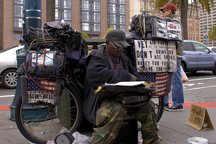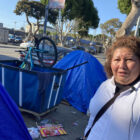Dozens of former military people recently lined up outside St. Anthony Foundation for survival gear — ponchos, water bottles and hygiene kits. But they won’t use these materials to survive overseas as they might have during their days in the service. The more than 2,000 vets likely will use them in the more familiar terrain of San Francisco’s streets.
The outreach, along with another one the same week that provided medical attention, personal services and information about available housing at the VA clinic, are the first steps in a five-year, national plan to end — and prevent — homelessness among veterans.
One component of this $3.2-billion initiative, announced by Secretary of Veterans Affairs Eric Shinseki’s earlier this month, is a collaboration between the Veterans Administration and the Department of Housing and Urban Development to provide permanent housing to more than 20,000 veterans and their families. The VA also is working with community organizations to provide transitional housing.
The VA estimates the nationwide population of homeless vets to be 131,000.
“It’s a crime committed by the U.S. government for veterans to be out on the streets,” said Jawanza Bomani, a former U.S. Marine combat soldier.
The city’s homeless vets — 2,075 according to VA numbers released in 2007 — are due to receive the first round of vouchers for supportive housing, said Bobbie Rosenthal, the VA’s regional coordinator for homeless programs. St. Anthony Foundation – an organization that responds to the needs of poor and low-income San Franciscans – estimates one-third of the people using their homeless services are veterans.
“It’s an administration that wants to tackle (this problem),” Rosenthal said, referring to the Obama administration. She greeted the veterans at St. Anthony’s, who co-sponsored the event with the VA and Swords to Plowshares, a city-based nonprofit dedicated to reducing poverty among veterans.
Swords to Plowshares operates two residential facilities, including the Veterans Academy that houses 102 people in the Presidio. Bomani got on the waiting list there. “It’s a life-saving measure,” he said of the effort.
Marquez Jackson, a former Navy machinist mate now in drug rehabilitation, said he expects a spot to open at the academy in three months.
“I’ll do that until I get on my feet,” Jackson said.
Swords to Plowshares reports that veterans returning from Iraq and Afghanistan are facing economic adversity in the current downturn. Their military skills often don’t transfer to civilian workplaces and reservists often lose their jobs because of business failures, downsizing or job relocation. In fact, they’re becoming homeless faster than their Vietnam-era counterparts, said spokeswoman Colleen Corliss. She emphasized that more than 1,800 veterans of current wars have already sought homeless services.
Corliss also cited a 2008 VA study determining high rates of poverty and joblessness among Iraq and Afghanistan vets. It reported that 18 percent are unemployed and 25 percent of former servicemen earn less than $21,840 annually.
“They’re returning to little or no economic stability,” she said.
Veterans also are coming home to a country that has cut federal spending on affordable housing since 1980. For this reason, Paul Boden, executive director of the Western Regional Advocacy Project, said he is skeptical of the VA plan. He has already heard the federal government set up timelines to end homelessness only to have it fall short.
“I don’t see anything in (Shinseki’s) announcement that revitalizes housing programs like they need to be revitalized,” Boden said. “This isn’t some special little project. It’s a major systemic failure.”
Boden said he believes only Franklin Roosevelt-style reform can restore affordable housing funding to pre-Reagan era levels.
“It’s way past time for a new New Deal,” he said.











